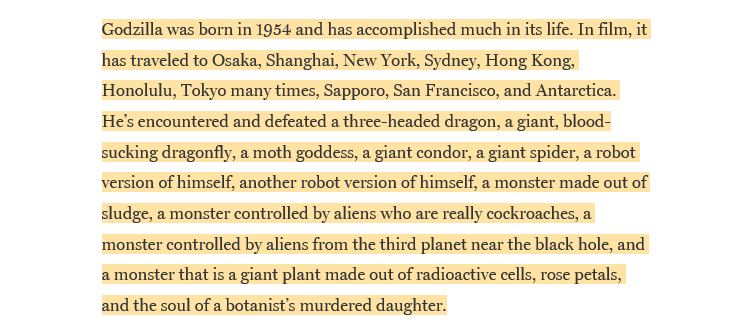- At time of writing, Godzilla, ‘the ultimate territorial, invasive creature’ has inspired a remarkable thirty-one movies over sixty-three years. What besides ‘awesomeness and sadism’ draws us to obsess about Godzilla and monsters like him, asks Clinton Crockett Peters? Violent catharsis or the projected fear that we will destroy the Earth ourselves? In This Young Monster, a book-length study of the monstrous, Charlie Fox arrives at a similar conclusion: ‘The abundance of monsters in circulation now proves that the collective imagination is in a strange and disorientating state, at once fearful of what can be done to the body through technology or trauma and fascinated by the possibilities those changes represent.’

- Hilton Als celebrates a new collection of Frank Bidart’s poetry, which brings together eight previous volumes along with a new sequence. Gay kids with straight parents inevitably develop a sense of difference and isolation, argues Als, but this difference can be insightful. ‘Standing both inside and outside the parental home’, gay and lesbian poets like Bidart develop astute awareness of the systems of family and society. ‘You learned early that adults’ genteel / fantasies about human life / were not, for you, life’, wrote Bidart in his 2013 poem ‘Queer’.
- For International Literacy Day, we’re revisiting Ocean Vuong on his experience learning English as a new immigrant to the US, realising that ‘not being able to read does not mean that one is empty of stories’. Yet reading and writing hold such a dominant position in our culture – without literacy, we are powerless. In her new book The Mother of All Questions Rebecca Solnit urges women to recognise the oppression of historic silence and the liberating potential of storytelling.
- In Roald Dahl’s Marvellous Medicine, Tom Solomon describes how the medical tragedies in Dahl’s own family – his son’s hydrocephalus, wife’s stroke and daughter’s death from measles aged seven – motivated him to invent a brain-drainage valve, co-write an influential stroke textbook, and advocate for measles vaccination, the latter in the form of a characteristically unpatronising letter to children. These tragic events also inspired his fiction: Solomon compares the playful neologisms in The BFG to the language of Dahl’s post-stroke wife, who, unable to remember original words, would invent new ones.
- This year marks the twentieth anniversary of Kathy Acker’s death from cancer at the age of fifty. Chris Kraus’s After Kathy Acker is a celebration and commemoration of the late artist. ‘I realized that I might be the perfect person to write her biography,’ admits Kraus in an interview with Granta, noting their common reference-points in life. In an extract from the book, Kraus focuses on Acker’s unique fashion, describing her iconic look: ‘her face is in profile, and an artfully razored line on her buzz cut flows across her jeweled ear to the base of her neck from her forehead.’
- John Ashbery passed away last weekend at the age of ninety. In this exquisite meditation for the New Yorker, Ben Lerner remembers the correspondence he had with his hero, and celebrates the particular way Ashbery ‘makes the (mild) shock of recognition and the (mild) shock of the new coexist’. For more tributes, interviews and critical considerations, the Harriet Staff at the Poetry Foundation have out-rounded us, with this rigorous list.
Image © Tommaso Galli






